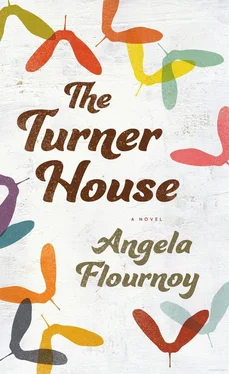“Do you know that before he would give me the money he made me get to his house at five in the morning for a month? He didn’t want me to shovel snow, or do any chores or nothing. I just had to get there at five, and he’d come down the stairs in his pajamas when he felt like it, let me into the house, then go back to sleep. And his own sons were upstairs sleep the whole time! Fuck was the point of that, huh? Even in the navy, if they made us wake up at the crack of dawn, there was a point, we did some drills or whatever. Me standing outside, I couldn’t even do my homework, I stood there on the front step looking like a fucking burglar. I know he just did it cause he could. And every day that I had to go to practice without the gear I felt like shit cause you know the white boys on the team came back with their money the very next day. You know how cold it is at three-thirty in the morning in the winter? I’d be standin at the bus stop on the east side hopin I didn’t get jumped, freezin my ass off.”
Troy breathed quickly. The veins in Jillian’s neck relaxed.
“I’m sorry, babe. He probably thought he was building your character or something.”
“It’s true,” she added after a while. “The banks are being extra predatory right now. I saw it on the news. They know people can’t pay their mortgages, they knew it when they gave them the loans or let them refinance, but they refuse to renegotiate.”
Troy nodded. He hadn’t intended to tell her about Cha-Cha and the basketball gear. It was a stupid, old, humiliating story, but it had done the job.
Had his childhood been a happy one? The question felt irrelevant. Cha-Cha had made it through. He couldn’t recall being extraordinarily unhappy—he was clothed, fed, never molested, and never beaten beaten. Alice had posed the question to him earlier that morning, and now he posed it to his sister Francey in her Oak Park kitchen. He lay on his stomach underneath the kitchen sink, breathing in mildew and straining to snake the plug for her new alkaline water-filtration system to a power outlet in the adjacent cabinet. Francey’s husband, Richard, had electrocuted himself as a boy by jamming a fork into a socket, and now he avoided even minor electrical work. Every once in a while Francey would call Cha-Cha over to hook up a sound system, install a new light fixture, or fix the sprinklers, and during these visits Richard was nowhere to be found.
“What a weird thing to ask,” Francey said. “You say this woman’s black, huh?”
“Darker than you and me.”
Plug finally secured, Cha-Cha rolled onto his back on the tile. Francey hovered over him. The track lighting on the ceiling made her close-cropped silver afro glow. With her cat-eye glasses and sparkly green earrings, she looked extraterrestrial.
“That’s really what goes on in therapy? They ask you to drag up a whole bunch of stuff from childhood? I thought that was just on TV. We’re so old! At some point that stuff doesn’t matter no more.”
“I said . . . the same thing,” Cha-Cha said. He tried to catch his breath. Sweat trickled down the back of his neck. “Unless something crazy had happened.”
“And nothing crazy did,” Francey said.
Cha-Cha sat up, reached his hand out, and Francey yanked him to his feet. At sixty-two years old she was surprisingly strong. Stronger than he was, Cha-Cha suspected.
“Uh-huh. But Alice kept going on about deep-seeded trauma, and how something old like that could be a reason I see this haint.”
“Weird,” Francey said again. “We weren’t traumatized. Just poor.”
“Right. Which means you’ve got holey socks, maybe, hand-me-downs.”
“And you eat starchier food,” Francey said. “Lord, we ate so much greasy, nasty food growing up! I can’t hardly stand to think about it now. Just pork, pork, pork, pork. Mama cooked damn near every thing with pork.”
“Oh hell,” Cha-Cha said under his breath. Unhealthy food was Francey’s favorite hobbyhorse. There was nothing to do now but wait her out.
“That’s why when folks say they can’t understand how I’m a vegetarian I always say I got enough meat in my system to last me the rest of my life.”
“Mmm-hmm,” Cha-Cha mumbled. He opened Francey’s refrigerator and scanned the jugs of prune juice, carrot juice, and some sort of green juice that had separated into three distinct and disconcerting layers. If this is what it took to be as strong as she was at her age, Cha-Cha could live with being a little feeble. He settled on water.
It had been warmer out this morning than the previous week’s visit. Alice took off her purple cardigan halfway through the session. Her arms looked soft but not flabby. She had some of the smoothest-looking skin Cha-Cha had seen on an adult—supple, with a sheen he attributed to some sort of body oil. She had a light splotch of skin about the size of a dime on the inside of her right biceps. Cha-Cha couldn’t stop staring at it as they talked. Either a birthmark or a burn scar, he figured. He’d wanted to rub his thumb across it to feel if it was smooth or textured.
“Alice asked me if I think life would’ve been better without so many siblings,” he said.
Francey spun around from the far counter where she’d been bent over writing something, all the while still listing the perils of pork. She hissed through her teeth.
“What a stupid question. I mean, yeah, it coulda been better. But what do we know? What you say to her?”
Cha-Cha saw Francey’s question for the setup it was. Outside of joking about hand-me-downs handed down for far too long, or waking up at the crack of dawn to be first in the shower, the Turner children rarely discussed the disadvantages of being one of thirteen. Scrutinizing too closely why Viola and Francis had not stopped at two, or seven, or even ten children felt like wishing a sibling never born. And yet, each child thought about it, Cha-Cha was sure.
“I said what I always say. I don’t have time for what-ifs. Don’t see no point in it.”
In truth, since he’d started seeing Alice, his stance on what-ifs had softened. Now he caught himself analyzing many aspects of the way he was raised, when before he would have been content to remember the highlights and skim past the rest. It seemed a self-indulgent, pointless endeavor, but he couldn’t stop. Vignettes from this time or that time kept bubbling up in his memory. The logical next step was to think about how these experiences had helped make him the person he was. What if there had only been two Turner children, or five? Who might Cha-Cha have become?
“Remember when you and me and Mama and Daddy lived in that rented house off Lemay and Mack?” he asked.
“Oh, the not-so-ghetto ghetto.” Francey chuckled. “We thought we had it made cause the water stayed hot, and we had our own stove.”
“We did have it made, compared to that place in Black Bottom,” he said.
There had been three whole years between Francey’s birth and Quincy’s, then another two before Russell was born. By five years old Francey was already the boss, never mind that Cha-Cha was older. She’d gone on to teach third-graders at various Detroit public schools for twenty-five years until she was forced to retire, her obesity having led to a string of health issues. She’d devoted a good chunk of her life to wrangling children, and now all of her grandchildren lived out of the state.
“Plus,” he added, “Daddy stopped workin at the salt mine so he could work for Chrysler, which made him less depressed.”
Francey frowned and picked up the magnetic dry-erase board she’d been writing on and stuck it onto the fridge.
Читать дальше












